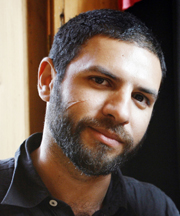New York, March 11, 2011–The Committee to Protect Journalists calls for the immediate release of Ghaith Abdul-Ahad, left, a correspondent for London’s Guardian newspaper whom Libyan officials now acknowledge holding in detention. CPJ also demands that authorities halt ongoing obstruction and intimidation of journalists. A number of foreign journalists invited to cover events in the capital were prevented today from reporting on anti-government protesters in a Tripoli neighborhood, according to news reports.
After The Guardian this week issued a public plea for information on Abdul-Ahad’s whereabouts, the Libyan Foreign Ministry in Tripoli acknowledged that the reporter was in state custody, the newspaper reported late Thursday. The basis of the detention was not disclosed. Abdul-Ahad, an award-winning war correspondent, had been reporting from an area near the coastal city of Zawiya, where there has been heavy fighting between rebels and forces loyal to Muammar Qaddafi. He had dropped from sight after contacting his paper through a third party on Sunday, according to The Guardian.
“We are relieved that the Libyan authorities have at last acknowledged holding Ghaith Abdul-Ahad. The next step is for them to release him immediately,” said CPJ Deputy Director Robert Mahoney. “The government in Tripoli invited in the foreign press but has tried to corral them and manage what they see. It must allow the media to work freely and stop detaining journalists.”
Today, a group of foreign journalists was prevented from covering protesters who had gathered in a mosque in the Tajoura district of Tripoli, Reuters reported. The journalists were approached by men in uniforms, told they must leave, and then driven back to their hotel. Another reporter who tried to reach Tajoura by taxi was stopped by police and barred from traveling there, Reuters reported.
Although Libyan authorities had invited international journalists to report from the capital, they have since sought to restrict reporting activities. A week ago, on March 4, authorities had prevented international journalists from reporting on a government crackdown on protests in the Tajoura district. Foreign journalists also report that they are constantly under the watch of government minders and, at times, detained by security and military forces.
Borzou Daragahi, a reporter for the Los Angeles Times, described an “almost surreal” atmosphere in which “government agents in leather trench coats and sunglasses hover at hotel entrances.” Daragahi reported Wednesday that media staff working for eight news outlets, including the Los Angeles Times, the BBC, and Agence France-Presse, had been detained Saturday outside Zawiya for nearly seven hours.
Peter Beaumont, reporting from Tripoli for The Guardian, reported Tuesday that “journalists cannot operate freely in Tripoli at all, despite repeated promises from individuals including [Qaddafi’s] son, Saif al-Islam, and the deputy foreign minister, Khalid Khayem.” The Guardian reporter said he had been detained twice since he arrived in Libya. Among those held near Zawiya for hours on Saturday, Beaumont was later detained for three hours by military forces at a Tripoli checkpoint. Three other journalists were detained with him in the Tripoli episode, he said. “As the country becomes ever more difficult to report from, what is happening to ordinary Libyan civilians is ever more effectively being censored. And at some point, by our very presence, in being ineffective we will become accomplices in that censorship,” Beaumont wrote.
Since Libya’s political unrest erupted last month, CPJ has documented more than 40 attacks on the press. They include 25 detentions, four assaults, two attacks on news facilities, the jamming of Al-Jazeera and Al-Hurra transmissions, at least three instances of obstruction, and the interruption of Internet service. At least six local journalists are unaccounted for as of today. Numerous journalists have also reported the confiscation of equipment. For details, see our daily coverage:
